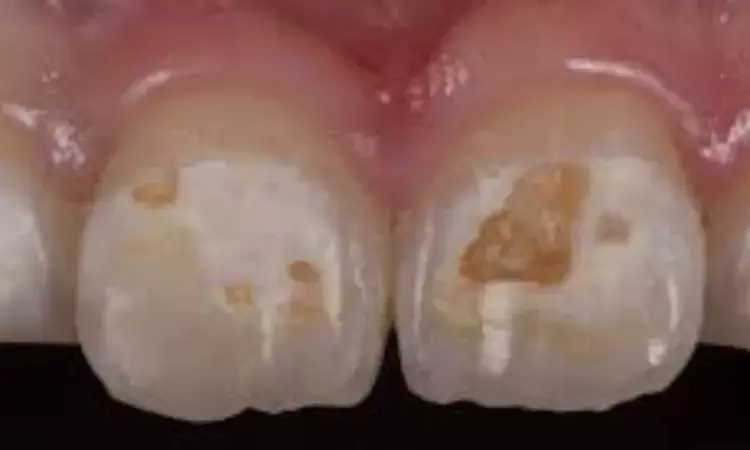- Home
- Medical news & Guidelines
- Anesthesiology
- Cardiology and CTVS
- Critical Care
- Dentistry
- Dermatology
- Diabetes and Endocrinology
- ENT
- Gastroenterology
- Medicine
- Nephrology
- Neurology
- Obstretics-Gynaecology
- Oncology
- Ophthalmology
- Orthopaedics
- Pediatrics-Neonatology
- Psychiatry
- Pulmonology
- Radiology
- Surgery
- Urology
- Laboratory Medicine
- Diet
- Nursing
- Paramedical
- Physiotherapy
- Health news
- Fact Check
- Bone Health Fact Check
- Brain Health Fact Check
- Cancer Related Fact Check
- Child Care Fact Check
- Dental and oral health fact check
- Diabetes and metabolic health fact check
- Diet and Nutrition Fact Check
- Eye and ENT Care Fact Check
- Fitness fact check
- Gut health fact check
- Heart health fact check
- Kidney health fact check
- Medical education fact check
- Men's health fact check
- Respiratory fact check
- Skin and hair care fact check
- Vaccine and Immunization fact check
- Women's health fact check
- AYUSH
- State News
- Andaman and Nicobar Islands
- Andhra Pradesh
- Arunachal Pradesh
- Assam
- Bihar
- Chandigarh
- Chattisgarh
- Dadra and Nagar Haveli
- Daman and Diu
- Delhi
- Goa
- Gujarat
- Haryana
- Himachal Pradesh
- Jammu & Kashmir
- Jharkhand
- Karnataka
- Kerala
- Ladakh
- Lakshadweep
- Madhya Pradesh
- Maharashtra
- Manipur
- Meghalaya
- Mizoram
- Nagaland
- Odisha
- Puducherry
- Punjab
- Rajasthan
- Sikkim
- Tamil Nadu
- Telangana
- Tripura
- Uttar Pradesh
- Uttrakhand
- West Bengal
- Medical Education
- Industry
DNA methylation at birth linked to dental caries and hypomineralization: Study

DNA methylation at birth is associated with dental caries and HSPM, according to a new study published in the Journal of Dentistry.
A study was conducted to examine Epigenetic modulation of gene expression may be important in dental conditions, including dental caries and enamel hypomineralisation. The aims of this study were to assess associations between DNA methylation in cord blood leucocytes at birth, and caries experience and enamel hypomineralisation at six years of age.
The study sample was from a birth cohort study of twins. Dental examinations at six years identified the presence/absence of (i) 'any caries' (untreated and treated caries), (ii) 'advanced caries' (untreated, advanced caries and/or past treatment) and (iii) hypomineralised second primary molars (HSPM). Genome-wide analysis of DNA methylation was performed on cord blood of 27 twin pairs (14 dizygotic and 13 monozygotic) using the Illumina Infinium MethylationEPIC BeadChip array. Differentially methylated CpGs (DMCpGs) and regions (DMRs) associated with each dental outcome were investigated while accounting for the relatedness of twins. Results with a false discovery rate <0.05 were treated as statistically significant.
The Results of the study are:
19 children had 'any caries', 15 had 'advanced' caries, and 18 had HSPM. No DMCpGs were associated with 'any caries', 16 and 19 DMCpGs were associated with 'advanced caries' and HSPM, respectively. DMRs were identified in association with all three outcomes. Genes implicated by these analyses included PBX1, ACAT2, LTBP3 and DDR1 which have been linked with dental tissue development in genetic studies.
Thus, the researchers conclude that the exploratory study identified differential methylation in several genes at birth associated with dental caries and HSPM at six years. Further research may provide valuable insights into the aetiology of dental disease and/or reveal novel molecular-based approaches for early risk stratification.
Reference:
DNA methylation in childhood dental caries and hypomineralization by Silva MJ et al. published in the Journal of Dentistry.
https://www.sciencedirect.com/science/article/abs/pii/S0300571221003353
Dr. Shravani Dali has completed her BDS from Pravara institute of medical sciences, loni. Following which she extensively worked in the healthcare sector for 2+ years. She has been actively involved in writing blogs in field of health and wellness. Currently she is pursuing her Masters of public health-health administration from Tata institute of social sciences. She can be contacted at editorial@medicaldialogues.in.
Dr Kamal Kant Kohli-MBBS, DTCD- a chest specialist with more than 30 years of practice and a flair for writing clinical articles, Dr Kamal Kant Kohli joined Medical Dialogues as a Chief Editor of Medical News. Besides writing articles, as an editor, he proofreads and verifies all the medical content published on Medical Dialogues including those coming from journals, studies,medical conferences,guidelines etc. Email: drkohli@medicaldialogues.in. Contact no. 011-43720751


